
Texas Tech University is a public research university in Lubbock, Texas. Established on February 10, 1923, and called Texas Technological College until 1969, it is the main institution of the five-institution Texas Tech University System. The university's student enrollment is the seventh-largest in Texas as of the Fall 2018 semester. As of fall 2020, there were 40,322 students enrolled at Texas Tech. With over 25% of its undergraduate student population identifying as Hispanic, Texas Tech University is a designated Hispanic-serving institution (HSI).

Thomas Robert Cech is an American chemist who shared the 1989 Nobel Prize in Chemistry with Sidney Altman, for their discovery of the catalytic properties of RNA. Cech discovered that RNA could itself cut strands of RNA, suggesting that life might have started as RNA. He also studied telomeres, and his lab discovered an enzyme, TERT, which is part of the process of restoring telomeres after they are shortened during cell division. As president of Howard Hughes Medical Institute, he promoted science education, and he teaches an undergraduate chemistry course at the University of Colorado.
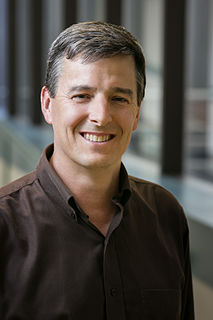
John A. Rogers is a physical chemist and a materials scientist. He is currently the Louis Simpson and Kimberly Querrey Professor of Materials Science and Engineering, Biomedical Engineering, and Neurological Surgery at Northwestern University.
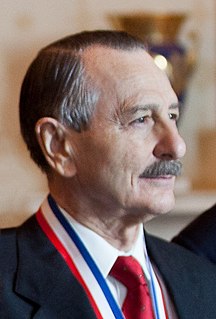
Ralph Lawrence Brinster is an American geneticist, National Medal of Science laureate, and Richard King Mellon Professor of Reproductive Physiology at the School of Veterinary Medicine, University of Pennsylvania.

Mary Jo Nye is an American historian of science and Horning Professor in the Humanities emerita of the History Department at Oregon State University. She is known for her work on the relationships between scientific discovery and social and political phenomena.

Thirumalachari Ramasami is the former Indian Science and Technology Secretary. He assumed charge in May 2006. Prior to this assignment, he served as the Director of the Central Leather Research Institute, Chennai, India. He is a distinguished researcher and leather scientist. He was awarded India's National Civilian Honour the Padma Shri for excellence in Science and Engineering in 2001 and the Padma Bhushan in 2014. He was awarded the Shanti Swarup Bhatnagar Award, the highest award for science in India, for notable and outstanding research in Chemical Sciences in 1993.
Sung Wan Kim was a South Korean-American academic who worked as a distinguished professor of pharmaceutics and pharmaceutical chemistry at the University of Utah. He is the founder and co-director of the University of Utah's Center for Controlled Chemical Delivery.
Minjoong Yoon is a South Korean chemist and professor.
Satya Atluri is an Indian-American engineer, educator, researcher and scientist in aerospace engineering, mechanical engineering and computational sciences, who is currently the Presidential Chair & University Distinguished Professor at Texas Tech University. Since 1966, he made fundamental contributions to the development of finite element methods, boundary element methods, Meshless Local Petrov-Galerkin (MLPG) methods, Fragile Points Methods (FPM), Local Variational Iteration Methods, for general problems of engineering, solid mechanics, fluid dynamics, heat transfer, flexoelectricity, ferromagnetics, gradient and nonlocal theories, nonlinear dynamics, shell theories, micromechanics of materials, structural integrity and damage tolerance, Orbital mechanics, Astrodynamics, etc.
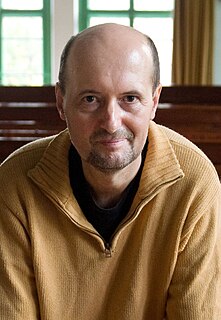
Peter Csermely is a Hungarian biochemist and professor at Semmelweis University. His major fields of study are the adaptation and learning of complex networks. In 1995 Csermely launched a highly successful initiative, which provided research opportunities for more than 10,000 gifted high school students. In 2006 he established the Hungarian Talent Support Council. From 2009 the council built up a nationwide talent support network involving more than 200,000 people by 2018. Between 2012 and 2020 he was the president of the European Council for High Ability. From 2014 they started to establish a European Talent Support Network having more than 400 cooperating organizations from more than 50 countries of Europe and from other continents in 2020.
Silvia Elsa Braslavsky is an Argentine chemist. She is the daughter of educationist Berta Perelstein de Braslavsky and biochemist Lázaro Braslavsky, and the sister of Cecilia Braslavsky, educationist and erstwhile director of the International Bureau of Education of UNESCO. She has two daughters, sociologist Paula-Irene Villa Braslavsky and Carolina Klockow.

Yeom Han-woong is a South Korean physicist. A tenured professor at POSTECH, he has led several research centers for the university and from 2013 in collaboration with the Institute for Basic Science. He is a Fellow of the American Physical Society and has served as vice chairman of the Korean government's first science and technology advisory group for three consecutive terms. With more than 300 publications to his name, his research has been cited over 5,000 times giving him an h-index of 40 and i10-index of 125.

Suh Yoo-hun is a South Korean neuroscientist. His researches focus on neurodegeneration, especially on the discovery of genes and therapies for Alzheimer's disease and Parkinson's disease.
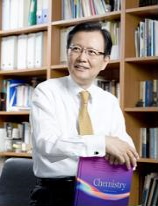
Choy Jin-ho is a South Korean scientist. He was a professor in the department of chemistry at Seoul National University from 1981 to 2004, and thereafter a distinguished professor and director of the Center for Intelligent Nano-Bio Materials (CINBM) at Ewha Womans University.

Choi Yang-do (Korean: 최양도) is a South Korean agricultural biotechnologist. His research focuses on the development of crops with stress-tolerant and yield-enhancing traits. One of his academic achievements is the discovery of a new jasmonate which enhances resistance against external stress of the crop. Choi is currently professor at Seoul National University in South Korea.
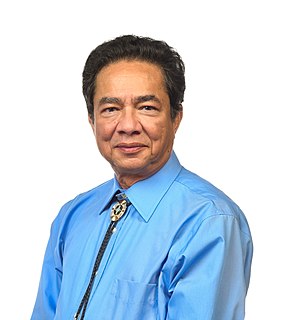
Purnendu K. Dasgupta is a professor of chemistry and biochemistry at the University of Texas at Arlington.

Daniel Wayne Armstrong is an American chemist who specializes in separation science, chiral molecular recognition, bioanalytic analysis, mass spectrometry and colloid chemistry. He is the Robert A. Welch Distinguished Professor at the University of Texas at Arlington. He has authored ~ 750 publications including 35 book chapters, a book, and holds over 35 patents on separation technologies. He was an associate editor for the prestigious American Chemical Society journal Analytical Chemistry and is a member of the national Academy of Inventors. Armstrong has given over 560 invited seminars worldwide at international conferences, universities and corporations. His research and patents formed the basis for two companies: Advanced Separation Technologies, Inc; which was acquires by Sigma-Aldrich Corporation in 2006 and AZYP, LLC in Arlington, TX. His published work has been cited over 46,200 times and his h-index is 109. He is believed to have mentored more graduate level analytical chemists than any living scientist.

Günter Petzow is a German materials scientist and former director at the Max Planck Institute for Metals Research.

Kim Dong-man is a South Korean food engineer. He is an expert in post-harvest management of fresh produce.














